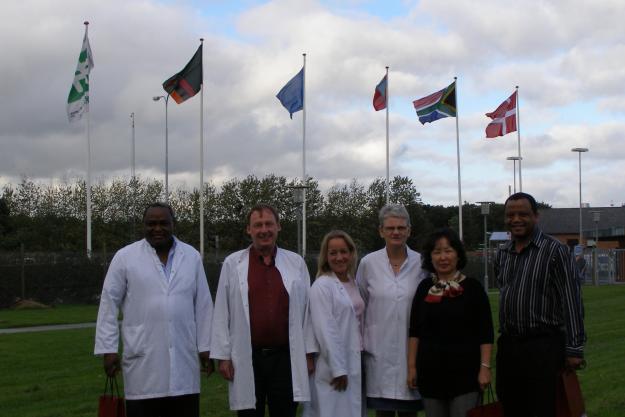
OPCW Associate Programme 2008 participants received training on how to run a modern chemical company in the DANISCO plant in Grindsted, Denmark. From left to right: Mr Katongo Chipompo from Zambia, professor Lars Wiebe, scientist Anita Lindahl, technician Sonja Lyngaas, Ms Oyun Batsukh from Mongolia and Mr Mashilo Mehale from South Africa.
In 2009 the Associate Programme has once again been expanded as part of the Technical Secretariat’s initiative of strengthened cooperation with Africa.
The OPCW launched its annual Associate Programme on 20 July 2009 at the OPCW headquarters in The Hague, the tenth in a series that began in 2000. The objective of the Associate Programme is to provide greater understanding of the Chemical Weapons Convention (CWC) for chemists and chemical engineers from OPCW Member States with developing economies, focusing on the peaceful uses of chemistry.
The programme aims to enhance Member States’ national capacity for implementing the CWC by offering training in chemistry to personnel from industry, universities and government agencies, and to facilitate trade through the adoption of best practices in the chemical industry. It also broadens the pool of future recruits for National Authorities, institutions and economies of Member States as well as for the Technical Secretariat.
In 2009 the Associate Programme has once again been expanded as part of the Technical Secretariat’s initiative of strengthened cooperation with Africa, which seeks to increase participation of African Member States in programmes and activities that promote the peaceful uses of chemistry and enhance national protective capacities. This year’s programme will include 28 Associates from 27 countries, including 15 participants from 14 African countries.*
The 10-week curriculum is designed to provide a broader understanding of advanced industrial practice with an emphasis on chemical safety. Associates will be hosted by chemical plants in the Netherlands, Belgium, Denmark, Germany, India, Italy, Japan, Poland and Spain, and will participate in a 3-week “Chemical Engineering-Oriented Skills Development Course” at the University of Surrey, UK. All of these Member States and their national chemical industry associations have extended their support to the Programme.
In addition, the United Kingdom has made a financial contribution for meeting the costs related to the university segment in Surrey, while Japan has made an in-kind contribution to support interpretation services for the participants during their industry training in Japanese companies.
* Algeria, Bangladesh, Burkina Faso, Burundi, Cameroon, Colombia, Cuba, Ethiopia, Ghana, India, Jordan, Kenya, Lao PDR, Madagascar, Malaysia, Malawi, Nigeria, Pakistan, Peru, Philippines, Qatar, Senegal, Sudan, Suriname, Uganda, Vietnam and Zimbabwe.
